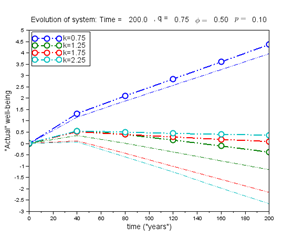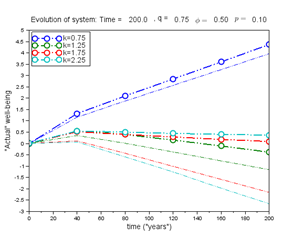Lifestyle tradeoffs and the decline of well-being 1.0.0
This code implements a semi-quantitative mathematical model of the changes over time in the statistical distribution of well-being of individuals in a society. The model predicts that when individuals overvalue the more socially conspicuous aspects of well-being in their lifestyle choices, then the average well-being of the overall population may experience continuous decline. In addition to tradeoff cost and overvaluation, we identify statistical variation in individuals’ well-being and turnover within the population as key factors driving negative trends. We investigate the influence of the effects of heterogeneity in the population, as well as economic and/or technological progress.

